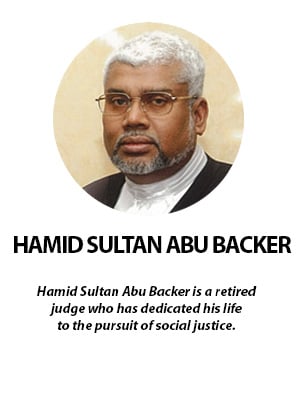
In my view, both as a practitioner and from the vantage point of the bench, Malaysia can lay claim to having some of the best-trained and most skilled prosecutors.
Yet, without ethics, that skill may be abused for persecution, aiding and abetting persecution, compromising the rule of law, and abuse of power.
It is, therefore, the paramount duty of the attorney-general (AG), who doubles up as the public prosecutor, to ensure that an accused not only gets a fair trial but is also guaranteed procedural fairness at all stages of the appeal process.
As a lawyer and judge, more specifically a whistleblower judge who has exposed judicial misconduct on affidavit, I can lay claim to having seen both the ethical and unethical conduct of prosecutors, including those who hold the high position of senior federal counsel.
I would define persecution in a criminal trial as grossly unfair conduct perpetrated on an accused with the sole intention of securing a conviction.
Such persecution would include situations where a prime minister directs an AG to prosecute his political opponents or anyone else. That persecution is institutionalised if a prime minister seeks to put in place judges and other supporting machinery for such a purpose.
Such actions are unconstitutional and unethical, and soil the integrity of a trial.
It is important that all those in the legal industry who are involved in such actions are charged for any such unconstitutional and criminal action.
In a jury trial, selective prosecution may not lead to conviction at all. A jury trial was a 1215 Magna Carta guarantee given by the King of England to ensure that the trying of facts is not vested in the judiciary. Judges are only entrusted with law. To this very day, even the English do not trust their judges to be both triers of facts and law as regards serious offences.
No one can assert that the Attorney-General’s Chambers (AGC) does not have enough talent to prosecute a high-profile person so as to require someone, trained or untrained, to be dragged in, either from the bar or a foreign country, to act as prosecutor.
In my view, by doing so, the AG would be acting unconstitutionally and demeaning his office and the prosecutors under his charge. Such actions may also amount to persecution.
I have previously expressed my agreement with the sole dissenting judge in Najib Razak’s application for a review of his Federal Court hearing that the former prime minister did not get procedural fairness in his SRC International case. In my view, that dissenting judgment makes out a case of constitutional illegality.
I am of the opinion that the rulers, as per their oath of office to sustain rule of law, have the constitutional power to correct such kinds of misconduct by constitutional functionaries or its agencies. These matters can also be raised in a petition for pardon.
Our founding fathers have entrusted the rulers with being the final arbiter to correct any form of misconduct and provide remedy and relief for abuse of power as well as unethical conduct.
However, our legal industry is extremely weak in appreciating the Oath of Office Jurisprudence and in consequence, the public has to suffer the consequences of a failure to uphold the rule of law in an ethical manner.
Here, I must point out that ethical conduct and compliance of law for a prosecutor and of a defence counsel is not one and the same.
The prosecutor’s role is to honestly present evidence to satisfy the requirement of law. However, even a skilled prosecutor cannot perform his task without the ethical support of investigation agencies.
On the other hand, the role of the defence is to find gaps in the prosecution’s case to assert that it does not satisfy the requirement of law.
A judge only sits in the position of a referee under the laws of the land to decide whether the prosecutor has satisfied the requirement to convict the person charged. The judge has no inquisitorial role to find out the truth.
All Malaysians must join hands to revamp the system with people of ethics and meritocracy. Can the Madani government achieve this?
I have the medicine and methodology to provide a robust system for trying of facts as per my concept which can be applied to criminal trials, too.
Ethics is a component pillar of Islam, and the Malay rulers are, by their Oath of Office, empowered to arrest unethical conduct of all Muslims, including those holding positions under the constitution.
Our legal industry must be cleansed of its “unethical” elements.
Religion without ethics has no utility in this world or hereafter.
As the guardians of Islam, it falls on the Malay rulers to root out all forms of unethical actions and behaviour in our legal industry to put Malaysia and Malaysians on an ethical path to sustain the rule of law.
If not, the abuse and bullying will continue to the detriment of the Malaysian public as well as the economy. - FMT
The views expressed are those of the writer and do not necessarily reflect those of MMKtT.


No comments:
Post a Comment
Note: Only a member of this blog may post a comment.